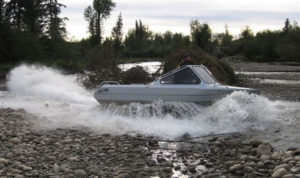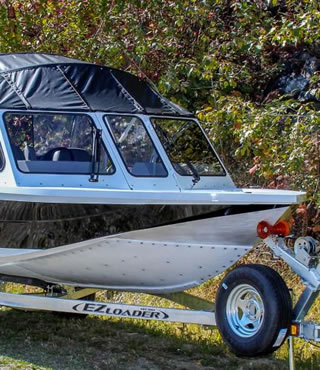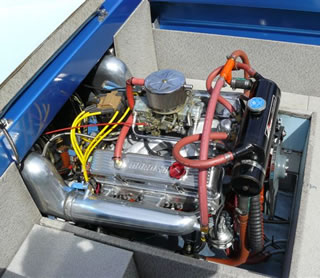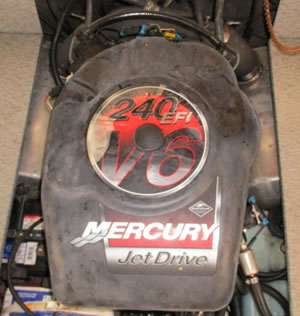Are You Getting Ready To Buy A Jet Boat?
There is much for a buyer to look for when buying any used boat, and jet boats are no exception. There are many different things you should be inspecting or paying attention to when looking at a used jet boat either at a dealership or being sold by a private seller.
Before you read our simple guide, most of what we’ve written is just shorter summaries of what is available in a fantastic FREE guide about jet boats titled the “General Boats Guide” and it was created by Marathon Marine, a custom jet boat builder out of Alberta, Canada that has been in the industry for many many years. That free guide is an amazing wealth of information for anyone who is getting into jet boating and looking to buy their first new or used jet boat. The information is well written, simple yet very technical and explains a ton about jet boats.
Is The Boat What You Really Want/Need For Your Intended Use?

The Water This 16′ Shuman Is Tackling Requires A Different Type Of Boat Than Running On Big Rivers Like The Fraser.
Don’t compromise! What are you going to be using the jet boat for? Hunting? Fishing? Wake Boarding or Water Sports? Tours or Guiding? Write down what you absolutely MUST HAVE on the boat to best meet the needs of your intended activity and buy the boat that meets almost all of, if not every one of those needs. Don’t compromise on a different boat only because it’s available.
Most jet boaters would agree that you almost need multiple jet boats for the activities that are possible and some of them do! If you don’t have deep pockets for multiple boats or a beautiful custom build then you need to really narrow down what you’re looking for.
There are dozens upon dozens of forum posts that start like this “I want to buy a jet boat”…. The person has no idea what size boat, what type of boat, what engine size, hull deadrise or any of the specifics. Nothing has been narrowed down. They just know they want a jet boat and these are the guys/gals that often suffer from buyers remorse or learn some harsh lessons about product/purchase research after they have bought the boat.
If you’ve done your research on jet boats and realistically narrowed down your usage you should be able to determine the exact size boat you need, engine size, pump type, hull dead rise and more. You’ll know all of this because you’ll have spent time researching the boats that are already going to the places where you want to go, there isn’t much point in re-inventing the wheel.
Here Are 3 Cardinal Rules You Shouldn’t Break!
#1. Don’t look at the boat in the dark. You’ll miss too much detail.
#2. Visually verify the boat has any upgrades or extras the current owner is claiming.
#3. Have the boat inspected by a facility that works on welded aluminum boats if you don’t know what you are doing. (we have many listed here)
Hull And Overall Condition
If you’re looking at a welded aluminum jet boat the type of hull and overall hull condition is pretty important. As is the build quality and amount of reinforcement in the hull if you intend on running the jet boat in skinny, rocky water which is common for those who use their jet boats for hunting.
- Are there any obvious dents or dings? Small ones are to be expected, something the diameter of a basketball and running down the side of the boat should probably be closely inspected.
- Are there are any cracks in the welds or in seams?
- What condition is the floor in? Can you see the condition of the stringers?
- What degree is the hull dead rise? 8°, 10°,12°,14°?
Does The Jet Boat Have Hull Protection?

This KingFisher 1775 Extreme Duty Boasts 1/2″ Thick UHMW.
Often mistaken as “armour” the hull protection on a jet boat or more specifically a river boat is designed to be slippery and reduce friction while offering some minor protection to the hull. This slippery hull protection is why some of these boats seem to seamlessly glide over rocky gravel bars and really shallow rocky channels. The boat is literally “sliding” over these obstacles.
Teflon was used in the past, there are various coatings people apply and now, the more popular option is UHMW (Ultra High Molecular Weight) plastic in varying thicknesses and attached using various methods (some better than others).
This type of hull protection is often bolted/lagged to hull of the boat. Over time (and scraping a lot of gravel and rocks) these bolts can begin to shift and bend which elongates the hole through the hull. This can lead to many water leaks considering there is often 60-100+ bolts holding the reinforcement on. If you see a boat with UHMW and the seller is advertising two bilge pumps, this is often why!
There are other ways to mount the UHMW too, such as a reinforced keel plate that is drilled and tapped and the UHMW is then bolted to. The most effective ways of mounting UHMW don’t require thru-hull holes. If you don’t intend on running rocky, shallow rivers then hull protection is not even something you need to consider.
Power Plant (engine/pump)

This Small Block Sits In An Older Ali-Craft Jet Boat. Look How Clean The Engine And Bilge Is? Signs Of A Well-Cared For Boat.
Inspecting an engine isn’t easy to do because you can’t see inside of it. With a little knowledge and some data, you can at least make an educated choice. If the seller knows the hours on the engine or there is an accurate hour meter, that can tell you a great deal of information about the boat.
The overall condition of the exterior of the engine can tell you a lot too. Is it it a high hour motor (500-1500 hours) covered in dirt, oil and grease or is the engine bay nice and clean? What does the bilge look like? A well maintained marine engine shouldn’t really be oily and dirty. And a boat owner who cares always keep a clean bilge!
- Don’t rule out a compression test on the engine. Check with a local mechanic or research the engine online to find out what acceptable compression should be in each cylinder.
- Don’t rule out a leak down test, which can reveal a lot more about the exhaust/intake valves and piston rings than a basic compression test.
- Inspect oil and any other fluids.
- Inspect the fuel filter (s).
- Inspect the water separator.
- Inspect condition of belts.
- Inspect condition of wiring.
- Listen to the engine run. (preferably you should hear it start from a cold start)
- Listen closely to the engine during a sea trial, does it miss? hesitate? bog? sound funny?
- How easy will finding parts be for the engine (whatever it is)

This High Hour 240 Sport Jet Looks Dirty. You’d Need To Dig Deeper To Know The Condition Of This Motor. It Might Be Great.
It seems there is a general consensus about how many hours is too many hours for a used jet boat. After going through many forum threads and speaking with many jet boaters it seems that anything over 500 hours is deemed to be risky, especially if you don’t know the boats history or any upgrades etc.. that may have been completed.
There is also a big difference in longevity between a 2 stroke Sport Jet V6 and a 4 cycle V8. If a V8 has been well maintained in a jet boat than a motor with over 1000 hours isn’t uncommon to find. If it’s a used sport jet boat then 200 hours seems to be a good benchmark on the hour meter a boat with 500+ hours might be due for a rebuild during the first few years of it’s use.
As always, do your due diligence. Another important fact to remember is that 175 and 240 Sport Jet engines are no longer manufactured they have been replaced by an Optimax 200 sport jet. A good thing to know if you don’t live near a city center where parts might be available.
Jet Pump and Impeller Condition
There are quite a few manufacturers of jet pumps out there. The ones to watch for are Berkeley, Dominator, Hamilton, American Turbine, Scott, Kodiak and more. There are better pumps than others depending on what your needs or uses of the boat will be. There are also several models of pumps. You’ll see names like SD-309, SD-312, 212, and more. It’s always worth a couple Google Searches to research the specific pump in a boat you’re looking to buy.
Here are some questions you should be researching related to the jet pump.
- What type of pump is it? Will it be easy to find parts for?
- How many hours are on the pump?
- Has any work been done to the pump?
- What is the condition of the impeller? Any knicks or chunks taken out?
- What do the intake grates look like?
- Pull the hand hole cover. Grab the impeller shaft and see if it moves at all (there shouldn’t be any play).
- Are there any extra add-on’s like a reverse bucket? These can be expensive to buy later!
- How easy will finding replacement parts be for the particular model of jet pump?
Electrical System
The electrical system is always a good indicator of the overall condition of a boat and whether or not the owner has kept up on it’s maintenance. Badly corroded, rat’s nests of wiring should probably be avoided unless you enjoy repairing this type of work. Most jet boats aren’t used in salt water environments, which are very harsh on electrical components and exposed wiring connections.
- Are the wiring terminations clean and tidy?
- Has there been lots of electronics spliced in? Cleanly?
- Any corrosion on the terminals? Especially in the engine bay?
- How old are the batterie(s)? What type are they?
- Is the charging system operational?
Boat Interior
Boat interiors aren’t important to the buyer who is looking to transport hunters and gear but it’s much more important to the buyer who wants to enjoy weekends on the lakes and rivers with the family or who enjoys travelling in style and with some of the luxuries modern builders are putting in their boats. Conditions of used boat interiors will tell you a lot about how the boat was cared for. Boats that have been stored outside can have gross looking interiors in just a couple years, while a boat that has been garage or shop stored can have an interior that looks brand new.
Convenience
Convenience is largely subjective… What might matter to one buyer another buyer just doesn’t really care about. There are some conveniences on a jet boat however that come in pretty handy.
- Stomp grates can make it easier to clean out debris from the jet intake.
- Walk-thru windshields are nice if you beach the boat often for hunting/camping.
- Diesel heaters are nice to have for those cold fall days.
- Winch mounts front and rear can help aid if you’re stuck (when you’re stuck!)
- Wash down pumps are very nice for clean up.
- Interior lighting can come in handy.
- Storage is always at a premium.
We’ll leave it up to you to determine what conveniences are most important to you in your own jet boat.
Weight Carrying Ability
Do you care about weight carrying ability for hauling heavy loads on hunting trips or long distance camping trips with more than 1 or 2 people? People, fuel and gear can add up weight fast in a jet boat. If you plan on carrying lots of weight in the boat, you’ll also likely need V8 power. If this is your situation, look for boats that have 6′ 6″ or 7′ bottoms. These boats can distribute the load much better in skinny water, even with the added weight of a V8 engine.
Is The Jet Boat Builder Still Around?
This may or may not be important to you, but in the last few decades there have been a number of jet boat builders who produced a handful of boats but are no longer are in business. There are also many custom “one-off” jet boat builds out there that will have little to no information about the hull. If you are looking at an unknown make or model of jet boat it wouldn’t a bad idea to create a post on one of the busy jet boating forums to ask some questions. You’ll likely get a few answers that could be helpful. Don’t be discouraged if the builder is no longer building boats it doesn’t mean the boat isn’t any good and you can still have the boat serviced and worked on by many different local jet boat dealers and service providers.
Looking For The Perfect Jet Boat?
JetboatsForSale.ca is a classifieds website for buying and selling jet boats throughout British Columbia and Alberta. Jet boats are for sale from dealers, brokers and private sellers and the listings are complete with great photos and detailed information about each jet boat.


Stay Updated On Our Social Networks